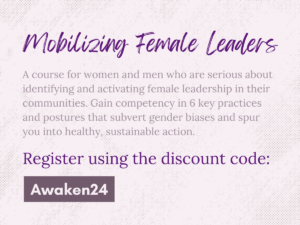Useful practices that make a really big difference in mobilizing female leadership – Part One
August 19, 2024Mobilizing female leadership…
Mahlah. Noah. Hoglah. Milkah. Tirzah.
More than likely, these names will feel unfamiliar (excepting the biggest Bible nerds and Hebrew language lovers among us.) Oh, and it’s not THE Noah you may have in mind. There are no animals or cataclysmic floods in the story I’m about to tell you, just a man named Zelophedad who died in the wilderness at the end of the Israelites’ exodus journey to the Promised Land. Zelophedad left behind five unmarried daughters, Mahlah, Noah, Hoglah, Milkah, and Tirzah just before Israel was to enter the land of Canaan and claim the land promised to each clan. Herein lies the plot conflict. According to Israelite inheritance laws, daughters were not able to share in the family estate, but instead received dowries when they married. Sons inherited the land of their father, and in this way, were able to maintain the family name in the family land over generations. This meant that our group of sisters, here, were to enter the land of promise with no claim upon their family’s estate. The laws and customs that worked for most of the Israelites had not accounted for them, and they were now vulnerable to displacement and poverty in the Promised Land.
This is the backdrop of Number 27:1-11. A short story in the Old Testament that transcends its cultural moment to offer us profound wisdom about how to address unjust systems. As we read this account together, I invite you to consider three practices for mobilizing female leadership and notice them at work in the story.
Mobilizing Female Leaders Practice 1: Naming
My working definition of this practice is “making the implicit explicit.” When we name someone or something, we accurately identify the value, role, contribution, or experience of that person or thing. The practice of naming in mobilizing female leadership can be as simple as giving credit to women when they make contributions. It can also look like speaking up when you notice that women are missing from decision-making spaces.
Mobilizing Female Leaders Practice 2: Permission-Giving
Because women have historically been excluded from leadership roles in many churches, many women do not assume that they have the right or permission to be leaders (you can read more about this here). That means that the women in your congregations and ministry may experience a greater need for permission to engage in certain kinds of ministry than the men in your context (read more about this here). You can think of the practice of permission giving as “explicitly authorizing someone for a particular role or task.”
Mobilizing Female Leader Practice 3: Reframing
Finally, reframing is the practice of subverting socially conditioned expectations with a Jesus-centered perspective. We all operate within systems and frameworks that were constructed with some degree of bias (whether intentional or unintentional). If we are to truly mobilize female leadership within ourselves and our contexts, we must reconsider our systems/customs/assumptions from a Jesus-centered perspective and allow Christ to reshape our assumptions and practices.
Okay, now— It’s time to see Mahlah, Noah, Hoglah, Milkah, and Tirzah in action:
The daughters of Zelophehad son of Hepher, the son of Gilead, the son of Makir, the son of Manasseh, belonged to the clans of Manasseh son of Joseph. The names of the daughters were Mahlah, Noah, Hoglah, Milkah, and Tirzah.
They came forward and stood before Moses, Eleazar the priest, the leaders, and the whole assembly at the entrance to the tent of meeting and said, “Our father
died in the wilderness. He was not among Korah’s followers, who banded together against the Lord, but he died for his own sin and left no sons. Why should our father’s name disappear from his clan because he had no son? Give us property among our father’s relatives.”
So Moses brought their case before the Lord, and the Lord said to him, “What Zelophehad’s daughters are saying is right. You must certainly give them property as an inheritance among their father’s relatives and give their father’s inheritance to them.
“Say to the Israelites, ‘If a man dies and leaves no son, give his inheritance to his daughter. If he has no daughter, give his inheritance to his brothers. If he has no brothers, give his inheritance to his father’s brothers. If his father had no brothers, give his inheritance to the nearest relative in his clan, that he may possess it. This is to have the force of law for the Israelites, as the Lord commanded Moses.’” (Numbers 27:1-11, NIV)
Did you see it?!
Mahlah, Noah, Hoglah, Milkah, and Tirzah, image-bearers of God in their own right, stand before Moses, Eleazar, the leaders, and the whole assembly (can you imagine?) at the tent of meeting (the place where God met with Moses, who mediated God’s instruction to the people of Israel). They boldly make their case to Moses and all present: “Why should our father’s name disappear from his clan because he had no son? Give us property among our father’s relatives.” What would be a given if they were men now required permission, and a great deal of courage to seek it.
Speaking of, have you ever considered the emotional and mental drain that women endure in pursuit of their ministry calling? Many of us cannot assume that we can or will be invited into ministry leadership. In fact, many of us have had encounters that taught us that we will be denied the opportunity to do so. We are often required to advocate for ourselves, outnumbered in the presence of countless powerful men, asking permission to be treated with the same regard as our brothers. Thankfully, Moses’ response to Mahlah, Noah, Hoglah, Milkah, and Tirzah’s request is a faithful one.
He does not quote the Torah at them.
He does not respond from what he thinks or knows.
He takes their case directly to the Lord who responds immediately with total and complete affirmation. What Zelophehad’s daughters are saying is right. You must certainly give them property as an inheritance among their father’s relatives and give their father’s inheritance to them.
Moses responds enthusiastically to God’s wisdom, not only giving permission to this group of sisters to inherit their father’s land, but altering Israel’s case law so that all daughters will have the same rights and protections as Mahlah, Noah, Hoglah, Milkah, and Tirzah. This, my friends, is a reframe.
What’s more, the Holy Spirit saw fit that our Scriptures would preserve this story and the names of Zelophehad’s daughters. Why? Because of the wisdom we gain from meditating on the courage of all involved. Of disregarded daughters whose advocacy ensures that all can take their rightful place in the land of promise. Of powerful men who humble themselves before the Lord and partner with their sisters to reimagine the way things work. Of communities who respond to the work of the Holy Spirit and champion the stories of courageous brothers and sisters.
Will we have this same courage? I pray that we do.
Talk to you next time!
Ericka Henry
Awaken is pleased to highlight Ekklesia Coaching, a paradigm-shifting ecosystem that cultivates healthy, sustainable leaders and organizations for the good of all. Ericka has graciously created a 25% discount for her course on Mobilizing Female Leaders, available through September 2024. Learn more by clicking the link below.





